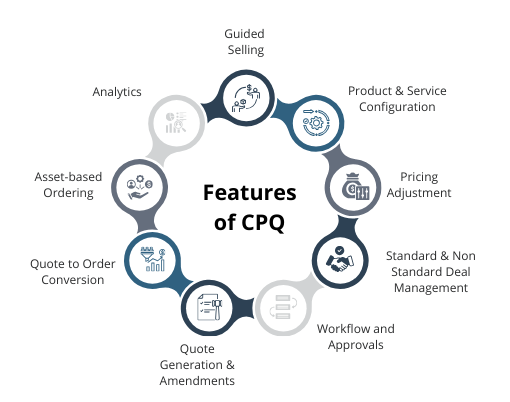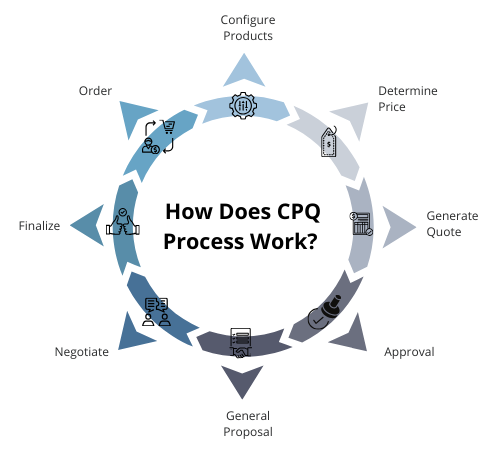What is Configure Price Quote?
Configure price and quote is an integrated sales process that helps sales representatives to efficiently sell complex products using a three-step approach by easily customizing products, calculating the price for custom orders and sending the quote to clients, without spending extensive time in approvals.
Simply put, the CPQ process eliminates human errors using an automated CPQ system to seamlessly manage the selling process and accurately and quickly produce quotes for clients, saving the sales reps’ and the client’s time. This ensures client satisfaction and improves the probability of sales closures.
What are the Features of CPQ?
A CPQ solution has multiple capabilities not just to enhance the sales experience for salespeople but also to provide valuable insights for sales managers, helping them track key sales metrics and continuously improve the sales process.
Here are the various features the CPQ offers:
1. Guided selling
A CPQ solution helps salespeople use predesigned questions, product parameters, recommendations and intelligent prompts to filter and identify products and services that ex meet the client’s needs, without manually entering each requirement.
2. Product & Service Configuration
This feature allows sales teams to configure complex products based on the custom assembly requirements of the client and generate quotes in real time with built-in CPQ capabilities of ERP software. Creating product bundles and different combinations of technical configurations becomes smooth.
3. Pricing Adjustment
Clients can request modifications to the original order, necessitating price adjustments and generating a new quote. With advanced CPQ pricing rules, you can easily accommodate order modification requests, apply discounts and override existing prices.
4. Standard & Non Standard Deal Management
Clients are always cost-focused and only pay for features they require in the product or service. That’s why, beyond just offering standard products, sales managers are progressively designing modular offerings with flexible pricing, enabling them to manage non-standard deals.
5. Workflow and Approvals
CPQ integrated within ERP system or CRM software provides advanced capabilities to design and automate the approval workflows and routine sales procedures, significantly reducing the time for approvals. Navigate different stages of the approval process with predesigned rules, efficiently handling rejection and triggering requests for re-approvals with updated quotations.
6. Quote Generation & Amendments
When making amendments to an ongoing contract with clients, price adjustments can become complicated. Whether you are adding new products and services or changing the quantities, ensure quoting accuracy with ERP software throughout the life cycle of the contract.
7. Quote to Order Conversion
A CPQ enables sales representatives to instantly generate the order within the sales management system after the client accepts the quote. Track key metrics such as quote conversion rate, which measures the percentage of quotes that result in successful conversion into orders.
8. Asset-based Ordering
Another defining feature of a CPQ solution is tracking all the products and subscription services the client purchases. These products and services are termed as ‘assets’ during the sales, delivery and customer support stages and help the sales team to make future offers based on the status of existing assets.
9. Analytics
One of the striking features of CPQ is its ability to provide insights into crucial product and sales data. CPQ system meticulously tracks transactional data to generate pricing trends, conduct value assessment to identify areas for improvement and measure client ROI to improve sales efficiency.
How Does CPQ Process Work?
Although the key steps included in the CPQ process are Configure Price and Quote, the sales reps have to follow a multi-step sales process to nurture the clients and close the deals, for which they are increasingly adopting automated ERP software and bringing agility in their sales process. According to the LinkedIn State of Sales India Report 2020, 74% of sales professionals believe that sales intelligence tools have a major role to play in closing sales.
Now let us understand the workings of the CPQ process and how it supports B2B sales teams in sealing the deal.
1. Configure Products
The CPQ process begins with configuring the products and services after receiving the client’s requirements and preferences. To do so, sales reps choose the relevant product specifications within the ERP system to filter out the ones not required by the client.
2. Determine Price
After configuring the offer, the next crucial step is to determine the price of the products and services. The pricing is tied to the product features and specifications the client selects and is generated by the ERP system.
3. Generate Quote
A quote contains complete details on product specifications and pricing and is shared with the client to give them an estimate of the cost. However, before the quote can be shared with the client, many organizations want the quote to be approved by seniors.
4. Get Approval
In contrast to the manual approval process, which can take days and delay the sales process, Configure Price Quote CPQ is automated where designated people within the sales department receive alerts about the sales quote. They can accept or reject the quote within the system and suggest improvements.
5. Send Proposal
Business deals require a formal documented process when dealing with clients, for which a general proposal with a complete offer, terms and conditions and proforma invoice is sent to clients. The clients review the proposal before accepting the deal.
6. Negotiate
The first proposal is always open to negotiation. That’s when both parties come to the table to negotiate the price, delivery terms, and payment details of the deal. After the discussion, the sales offer is sent for final approval.
7. Finalize
The internal teams review the final deal as discussed with the clients and if they are agreeable to all terms and conditions, they send their approval to the sales reps to accept the order via the ERP software.
8. Accept Order
As soon as the client sends the purchase order, the sales team forwards the order to the production department which begins the fulfillment process as per the configurations received.
Also Read: What is Proforma Invoice?
How to Implement CPQ Process?
As with any new enterprise solution with strategic potential, implementation of the CPQ process has to be done with due diligence to make the most out of your sales process. Follow this step-by-step implementation approach to leverage your existing sales process and infuse new momentum in your sales team.
1. Evaluation
List down the existing tools you have in place to manage the sales process. Determine what capabilities you want the new ERP system to have with which you can solve your problems and improve the efficiency of your sales process while enhancing client experience.
2. Vendor Selection
Talk to multiple vendors and explain in detail about your existing sales process. Describe your obstacles and which processes you want to automate on a priority. Find out if the new system can scale with your business and configure seamlessly with your existing tools.
3. Tailored Solution
Every business has unique technical products and specific selling procedures that have been delivering results for years. Request CPQ customizations that align with your specifications and service models so that they build upon your existing procedures and do not compel you into adopting something completely foreign to you.
4. Training & Support
When implementing a CPQ system, training and support are vital to ensuring that your sales team is confident in using the system. Taking regular feedback from the team, monitoring the system performance and identifying the scope for improvement is the best way to ensure long-term success for your sales department.
What are the Advantages of CPQ?
Now that we have understood CPQ meaning, how it works and its various features, let us find out what advantages the CPQ has to offer.
1. View Sales Pipeline
When the CPQ process is blended within enterprise solutions like the lead management system, the sales managers get a detailed view of the sales pipeline with real-time data on every lead. Further, they can track client requirements, access records of every order and perform sales forecasting.
2. Handle Technical Specifications
CPQ enables your sales team to configure the technical specifications the client requests. Besides, it reduces the training time required for sales executives when a new product or feature is introduced and minimizes the need to rely on technical experts, thus leading to faster onboarding of sales executives.
3. Save Time
After the clients specify their requirements, quotes can be delayed for many days during which the client can approach competitors and strike a deal with them. Therefore, CPQ ensures a faster sales cycle by generating timely and accurate quotes.
4. Reduce Errors
As the product specification details are extracted from ERP software, it minimizes the scope for errors during the sales process. The ERP uses sophisticated algorithms to apply complex business rules to determine pricing and configurations and deliver a customized offer to the customer.
5. Ensure Client Satisfaction
Clients expect quick responses from suppliers to know if they can cater to their specific requirements and provide them with instant quotes. Ensure a superior customer experience with CPQ as soon as the customer enters the sales pipeline to close deals faster.
Also Read: What is Sales Forecasting?
What are the Limitations of CPQ?
Although Configure Price Quote has a range of advantages, it also has certain limitations you should take into account.
1. Implementation Hurdles
Getting the CPQ system working just how you want it to be can be filled with challenges. No business wants to temper with its established sales system. Aligning the CPQ process with product specifications and all the pricing rules can get complicated, delaying implementation.
2. User Discomfort
One of the biggest concerns faced by companies is handling the resistance to change. Salespeople have already been relying on technology, which in some cases has lowered their productivity. Convincing them to use a new CPQ system, despite its transformational benefits, can be hard.
3. Continuous Improvement
No process is perfect to begin with. There is always a scope for improvement to make the system better with time and experience. Moreover, as you add new specifications and products to your portfolio, the CPQ system needs to adapt to the changing requirements of the business.
4. Integration Difficulties
Deployment of technology can be cost-intensive, depending on the specific needs of the business. If the CPQ system does not blend with your existing tech investment in ERP or CRM, you might want to reconsider your decision. Thus, return on investment becomes a key factor in decision-making.
Drive Revenue Growth with Next-Gen Sage X3
CPQ process enables you to easily configure complex technical products to meet the client’s requirements. The modular pricing structure helps determine feature-based pricing and generate a customized quote for every client, making the sales process extremely efficient and flexible for sales reps and clients.
Sage X3 ERP provides a resilient ecosystem that pulls all the levers for the company’s overall growth. Beyond just handling the product configuration, pricing and quote generation during the sales process, it can seamlessly collaborate with other departments and integrate with existing systems to help you fulfil orders on time and enhance the experience for your clients.
FAQs
1. How Do You Define CPQ?
CPQ full form is Configure Price Quote and it is a sales accelerator tool used by sales teams to configure technical products and services on the go, calculate the price of every feature and generate a comprehensive quote for the clients, eliminating the need for extensive communication with internal teams and technical experts during the sales process.
2. How Is CPQ And ERP Software Related?
CPQ is a sales process integrated within the sales management module of the ERP software which handles the complete end-to-end sales process for the organization.
3. How Is CPQ And CRM Software Related?
CRM is a customer relationship management software which has strong capabilities to incorporate the CPQ process and simplify the sales process for salespeople. However, the sales CRM has to be integrated with the ERP application to reap the full benefits for the organization.
4. What Are The Primary Benefits Of CPQ?
Here are the primary benefits of CPQ:
- Get a bird’s eye view of the sales pipeline for every client
- Configure technical products and services with ease
- Save time for the clients and sales reps
- Eliminate errors in pricing, ensuring high quoting accuracy
- Deliver a superior purchase experience to clients
- Improve sales closure rate








